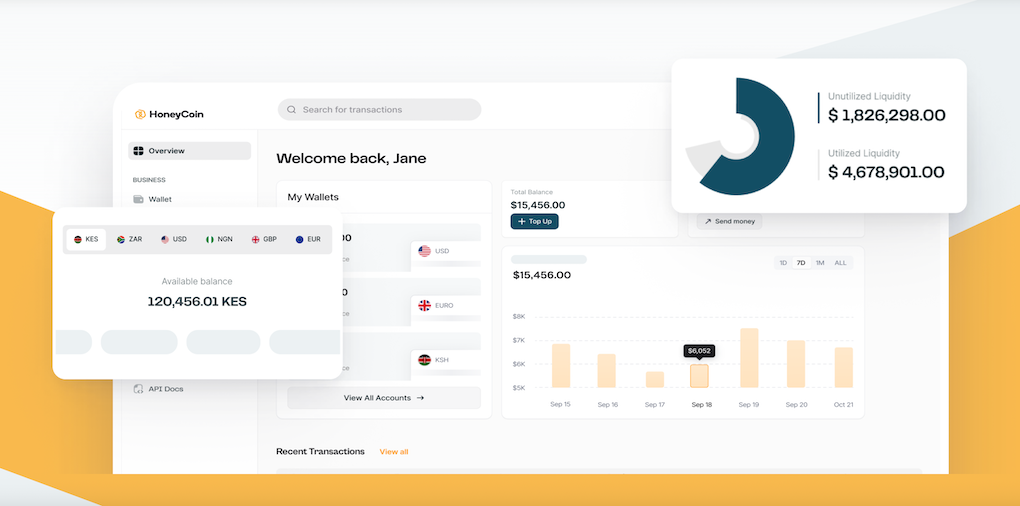Why We Invested in HoneyCoin

David Nandwa (center, seated) is rapidly growing the HoneyCoin team in Nairobi, Kenya. (HoneyCoin)
When we invest in a company, we invest in the founders as much as the idea itself. And when we decided to make Nairobi-based payments platform HoneyCoin our first blockchain investment as a firm back in 2021, we were betting on its incredible founder, David Nandwa, as much as the technology itself.
We believe that the future of money will exist in a hybrid world, one where the most successful platforms seamlessly integrate fiat and blockchain-based infrastructure to enable faster, cheaper, and more inclusive financial services, and David shares this vision. David is not only Africa’s youngest fintech CEO at age 24 (he was 21 when we met him, and just 19 when he launched HoneyCoin), but he’s one of the continent’s leading blockchain engineers. He and his team have built a sophisticated operating system largely built on cost-efficient cross-border money movement, and it’s now processing more than $100 million a month.
HoneyCoin’s traction and continued growth are what inspired us to co-lead the $4.9 million seed round in August, and we were joined by a mix of global and regional investors: Visa Ventures, TLcom Capital, Stellar Development Foundation, Lava, Musha Ventures, 4DX Ventures, and Antler. We’re encouraged by the great reception the HoneyCoin team has been receiving—they got over 90 media hits in the first week following this funding announcement.
2025 is the year of the stablecoin, and David and the HoneyCoin team are stepping up as leaders for Africa. In fact, David has been advising the Parliament of Kenya on crypto policy for the past two years, with skeptics in government recently turning to advocates after the passage of the United States’ GENIUS Act, itself following the European Union’s Markets in Crypto-Assets regulation.
Meet David, One of Africa’s Foremost Blockchain Experts

HoneyCoin founder and CEO David Nandwa is one of Africa’s leading blockchain experts. (HoneyCoin)
David wasted no time as a kid, learning to code as a nine-year-old, building multiple apps as a teen, and exiting two startups by age 19, when he founded HoneyCoin.
The a-ha moment for him came when he was working remotely for a friend’s US company via Kenya and got paid through a popular American payment platform. Well, he was supposed to have been paid. His account was flagged and frozen, and then he was told he would receive his payment in three months.
The same platforms that would work great between the US and Europe, for example, would often result in frozen funds in Africa. The continent’s lack of reliable, cost-effective cross-border options suddenly became both a tangible and pressing challenge for him, and it’s one he felt he knew how to address. He ended up giving the project a catchy name, HoneyCoin, and made it his focus during the 2020 pandemic lockdown. “Africa is consistently getting this leftover service,” he said. “I wanted to build a solution that works for Africans.”
Connecting African Businesses to Each Other and the World
The first iteration of HoneyCoin was geared toward consumers, with an emphasis on online creators collecting payments from an international fanbase. It wasn’t until Q2 of 2023 that it launched a B2B offering. It found an audience quickly, processing $45 million in payments in Q4 that year.
“Fast forward, and we’re ending 2024 at half a billion dollars per quarter,” David said. “That is where we knew that this is something that people really care about.”
He and his team decided to lean into the momentum last year, rebranding the B2C offering as Peer while retaining it under the HoneyCoin umbrella, but establishing the core brand-name offering as one solely serving enterprises. Today, Peer has more than 200,000 users, but HoneyCoin’s 350 enterprise customers—with big names in Africa like Jiji, MoneyGram, and Cedar—are the focus and driver of the business.
The current iteration of HoneyCoin is a B2B cross-border payments platform that enables businesses to collect, convert, and settle funds globally using a hybrid of fiat and stablecoin rails. It earns revenue through transaction fees (0.3%-1%), foreign exchange (FX) spreads (0.2%-0.8%), and subscription/API services, while also offering white-labeled embedded finance infrastructure (e.g., multi-currency wallets and treasury solutions). Its value proposition centers on faster settlements, lower costs, and regulatory compliance across Africa and other emerging markets
HoneyCoin’s infrastructure is already live across Africa, Europe, North America, and Asia, supported by a robust licensing stack. This geographic and regulatory footprint enables HoneyCoin to operate compliantly across high-growth corridors. Its full-stack platform includes: stablecoin minting and payout infrastructure with instant settlement; multi-currency wallets and virtual bank accounts; embedded APIs for cross-border payouts, treasury management, and merchant acquiring; and a growing acquiring solution with higher take rates and product stickiness.
HoneyCoin is capturing market share as financial institutions increasingly seek to integrate blockchain-enabled treasury and settlement solutions.
HoneyCoin's platform enables businesses to collect, convert, and settle funds globally using a hybrid of fiat and stablecoin rails. (HoneyCoin)
How It Works
Let’s use an illustrative example.
Imagine a Kenyan e-commerce platform that sells digital services globally and receives payments from customers in the U.S., Europe, and Asia. Normally, that platform would face delays, high FX fees, and pre-funding requirements using traditional banking rails. With HoneyCoin, here's what happens instead:
- The platform is assigned a virtual USD account by HoneyCoin via its acquiring/pay-ins product (or in some markets, there will be an actual sub-account created through a third party like Currencycloud).
- U.S. customers pay into that account either through a bank transfer or card).
- HoneyCoin instantly converts the USD into stablecoins (like USDC), moves it on-chain, and settles it into the platform’s Kenyan mobile money or local bank account.
- This happens in near real-time, with lower FX costs and no need for pre-funded accounts.
- The platform also uses HoneyCoin's API to embed this infrastructure into their own checkout or payouts experience.
Building for the Hybrid Future
While the market often debates the merits of TradFi versus DeFi, HoneyCoin is building a bridge between the two. It’s not a bet on crypto alone; it’s a bet on interoperability, where traditional financial institutions, payment service providers, and fintechs can leverage both fiat and blockchain tools to serve their customers better.
We believe that stablecoin-based players have the potential to outcompete traditional providers over time due to faster settlements, reduced pre-funding needs, and broader access to hard currency liquidity, especially in frontier markets where USD demand continues to outstrip supply. HoneyCoin’s hybrid approach, regulatory readiness, and infrastructure depth make it one of the most compelling fintech infrastructure plays in Africa and beyond.
David is working to bring Kenya along for the ride, and wants his home country to become a regional leader in sophisticated payments regulation. “Today we can confidently say that we’ve secured big wins for the industry by playing a key role in overturning the digital asset tax of 3% on gross value, and we successfully lobbied to have the Virtual Asset Service Providers Bill pass this year instead of going into further review next year,” he said.
As for HoneyCoin itself, David and his team are going to use the funding to expand their enterprise offerings, targeting customers from seed-stage startups to publicly-listed corporations, and to grow their headcount up from around 20. “We’re hiring across back-end and front-end engineering, business development, and customer support, and we’re looking for amazing storytelling and marketing people,” David said. HoneyCoin's careers page is here.